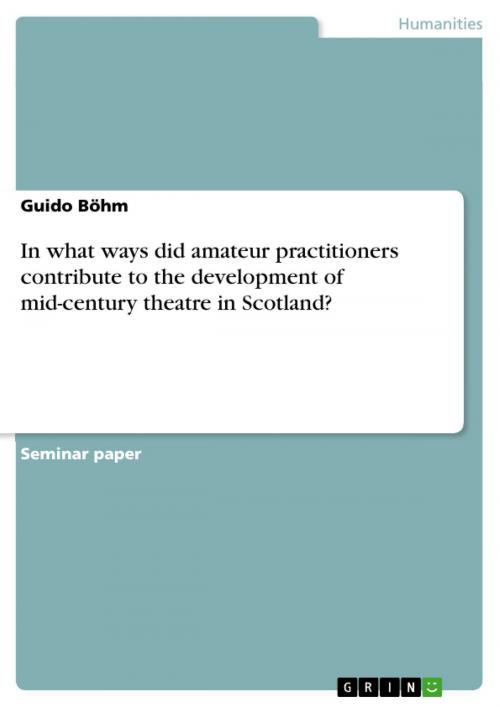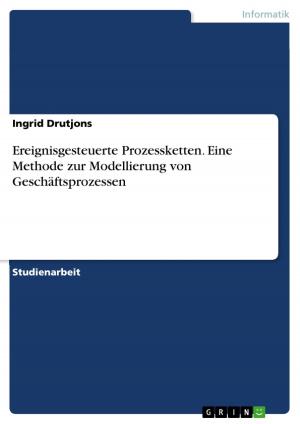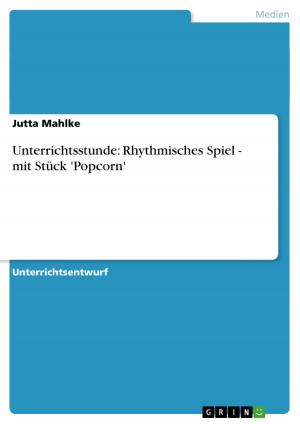In what ways did amateur practitioners contribute to the development of mid-century theatre in Scotland?
Nonfiction, Entertainment, Theatre, Performing Arts| Author: | Guido Böhm | ISBN: | 9783638575270 |
| Publisher: | GRIN Verlag | Publication: | November 29, 2006 |
| Imprint: | GRIN Verlag | Language: | English |
| Author: | Guido Böhm |
| ISBN: | 9783638575270 |
| Publisher: | GRIN Verlag |
| Publication: | November 29, 2006 |
| Imprint: | GRIN Verlag |
| Language: | English |
Seminar paper from the year 2001 in the subject Theater Studies, Dance, grade: B (2,0), University of Glasgow (Department of Theatre Studies), 5 entries in the bibliography, language: English, abstract: What nowadays is known as 'Scottish National Theatre' did not exist one hundred years ago. Though there were a high number of theatres in Scotland at this time, the programs performed on their stages were entirely dominated by English companies, English actors, English playwrights and directors. In general they were dominated by 'English Theatre' in the broadest sense. Even 'traditionally Scottish topics', such like Rob Roy, The Lady of the Lake and the like were performed on stage as if one would present a kind of a tourist attraction. The Scots could by far not find their history presented, as they understood it in these productions, for they were again London-based. However, through the economical situation in Scotland at that time and the complete lack of a dramatic tradition (like there has been one in England for several centuries), it was nearly impossible for emerging Scottish Playwrights and Companies to establish themselves. That hopeless situation changed in the first decades of the 20th century. Scotland felt a strong need for an independent, national identity and this should affect the theatre as well. Ambitions to follow the example of Ireland and to become theatrically independent lead to a serious effort in creating a national theatre. An important role in the formation of the lively Scottish theatre scene one can find today played the activity of amateur theatre, which was established by working-class communities. An amateur theatre movement had risen in Britain during the second half of the 19th century and it strongly influenced the industrial parts of Scotland (namely Glasgow) in the 1920s, 30s and 40s.
Seminar paper from the year 2001 in the subject Theater Studies, Dance, grade: B (2,0), University of Glasgow (Department of Theatre Studies), 5 entries in the bibliography, language: English, abstract: What nowadays is known as 'Scottish National Theatre' did not exist one hundred years ago. Though there were a high number of theatres in Scotland at this time, the programs performed on their stages were entirely dominated by English companies, English actors, English playwrights and directors. In general they were dominated by 'English Theatre' in the broadest sense. Even 'traditionally Scottish topics', such like Rob Roy, The Lady of the Lake and the like were performed on stage as if one would present a kind of a tourist attraction. The Scots could by far not find their history presented, as they understood it in these productions, for they were again London-based. However, through the economical situation in Scotland at that time and the complete lack of a dramatic tradition (like there has been one in England for several centuries), it was nearly impossible for emerging Scottish Playwrights and Companies to establish themselves. That hopeless situation changed in the first decades of the 20th century. Scotland felt a strong need for an independent, national identity and this should affect the theatre as well. Ambitions to follow the example of Ireland and to become theatrically independent lead to a serious effort in creating a national theatre. An important role in the formation of the lively Scottish theatre scene one can find today played the activity of amateur theatre, which was established by working-class communities. An amateur theatre movement had risen in Britain during the second half of the 19th century and it strongly influenced the industrial parts of Scotland (namely Glasgow) in the 1920s, 30s and 40s.















